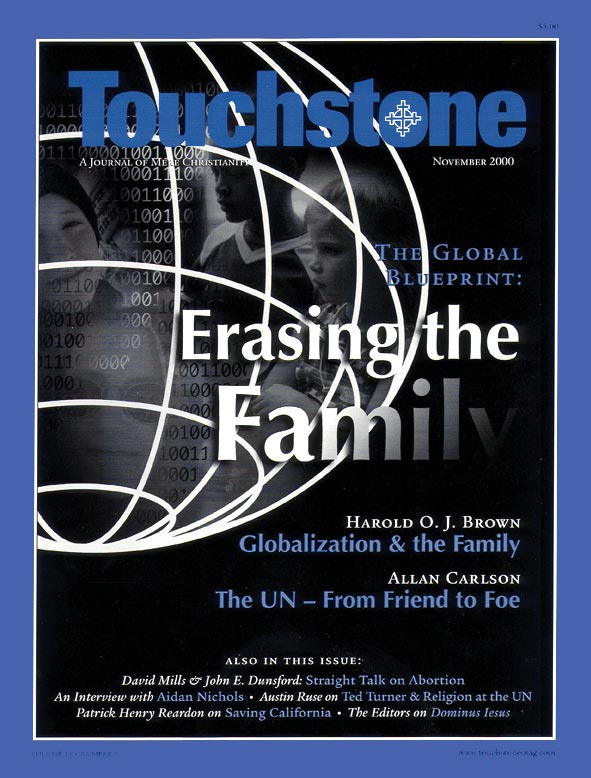Breaking the Ties That Bind
Globalization & the Family
by Harold O. J. Brown
Those who have been entertained by the American and international media with accounts of the 1998 White House melodrama will remember one of the deeper philosophical questions that emerged. The American president said, in effect, that everything depends on what is meant by “is.” In one pseudo-scholarly paper written to parody the situation, supposedly presented at a world meeting of “-isicists,” one contributor argued that “is” does not exist, or exists only for an infinitesimally tiny instant, for we pass instantaneously from “was” to “will be” with only the briefest of seconds at “is.”
Defining Our Terms
When I confront the topic that has been assigned to me, I sense a similar perplexity. Globalization is a scientific- or mathematical-sounding term, and perhaps it can be defined precisely. We might define it as meaning the situation in which national and regional loyalties become subordinated to the affairs of the entire globe. It is commonly used to refer to economic change, the integration of production and other economic activities across national boundaries, but it can also mean social, cultural, linguistic, and even religious integration.
But let us leave globalization aside for the moment: What is meant by “family”? Former US President Jimmy Carter, who was in office from 1977 to 1981, summoned a White House Conference on Families. This conference, among its other accomplishments, sought to define precisely what was meant by the word family. As with certain other words, until then, everyone thought that he knew what it meant. The purpose of the White House conference was to build up and strengthen families and to reaffirm “family values.” Suddenly it appeared that we were not quite sure what it was that we were supposed to build up and strengthen. To avoid accusations of favoring the “traditional family”—two parents, children, perhaps with grandparents, aunts, uncles, and cousins, all related by marriage or by blood—a new definition was proposed. The conference came up with a rather generic definition of family as “a group of people living together.”
This could enable us to consider a college fraternity, an army platoon, or even four convicts sharing the same prison cell a family. Perhaps here in Geneva we could call ourselves, for four days at least, one big family. I think that we are more precise, and whether we think primarily of the so-called nuclear family of husband, wife, and children, or of the extended family, including grandparents, uncles, aunts, cousins, and in-laws, we think of a group of people bound together, more or less for life, by covenants, both formal and natural. And thus, when I seek to examine the phenomenon of globalization in its influence upon the family, this is what I, too, mean by family.
When we come to globalization, I am reminded of a statement made years ago in a book by Peter Berger and Richard John Neuhaus. In the late 1960s the word and idea of revolution was “in.” Berger and Neuhaus believed that most people who used the word had no idea what it really meant. They said, in effect, “When they [i.e., student radicals] think of revolution, they think of something fine and noble. When I think of it, I think of dead children in the streets.” When its advocates think of globalization, they think of universal equality and universal harmony, of something like a universal Disney World, in which everyone has a beautiful costume, smiles are everywhere, and there are no paper plates and styrofoam cups left lying on the ground at night.
When I think of globalization, I think of something more like Jean Raspail’s Camp of the Saints, in which the building pressure of the impoverished millions of East Asia and the cowardly indecisiveness of the rich nations of Europe lead not to universal prosperity but to worldwide misery. Instead of the benefits of science, industry, education, and wealth being expanded to spread around the globe, the starvation, sickness, and ignorance of the poorest nations overflow the world.
The Fate of the Family
Globalization is not meant to work that way (and neither was revolution intended to lead to dead children in the streets). It was to mean the extension, to the entire world, of liberty, which Jean-Jacques Rousseau presented as one of the two essential goals of every government (the other being equality). But notice how he defines liberty and its implications: “Liberty, because every particular dependency is that much power taken by force from the body of the State, and equality, because liberty cannot exist without it.”1
Every particular dependency? Is not particular dependency precisely what is meant by family? Every particular dependency robs and weakens the State? Then liberty in his sense is incompatible with the survival of the family in the traditional sense. Rousseau’s concept of liberty involves breaking every interpersonal and intergenerational tie, making everyone dependent on no one—on no one, that is, except the State.
Implicit in Rousseau’s words is the abolition of the family; indeed, we know that he himself turned his own children over to public welfare. Within families there are rights, duties, and responsibilities of each member to the other members, established either by formal covenant, as in marriage, or by natural ties, as in the relationship of parents to children. The family is a small community, and it can exert and maintain itself far better within a context of slightly larger, but still small communities than within the very large and absolute community called the State.
When families exist in small communities, such as villages, there are additional rights and duties established by custom and tradition binding the families to one another. Other kinds of small communities, such as communities of faith, also know such ties, and ethnic groups and nations feel them as well. The smallest community, the family, can be at home in the somewhat larger community of the village or town. It is harder in the rather larger community of the nation, where it is in danger of being only a little molecule in the midst of Hannah Arendt’s atomistic mass.
In the process of globalization, as the size of the “community” approaches the infinite, or at least, as our world population has just done, when it passed the number of six thousand million, six billion according to American usage, the place of the family shrinks; it becomes so tiny on the scale of the world as to be invisible. The size of the little “particular dependencies” approaches zero and their ability to survive and live meaningfully disappears.
What we are saying is that whatever real benefits globalization may confer, the concept and the process are inimical to the health of the family. Big fish eat little fish, and a fish big enough to cover the globe is big enough to devour all of the little fish of the world. Ideally, the family is a source of identity, of self. This, the smallest intermediate structure, is clearly most at home in small communities, where such things as family names and maiden names can identify and create associations. Within the larger community of the State, the individual ceases to be identified as a member of such-and-such a family, as so-and-so’s daughter, son, or husband, and is recognized only by a number—in the United States, the Social Security number.
What Globalization Really Offers
Globalization is the concept or ideal that tells us not that small is beautiful, but that small is pitiful and out of date. The nation replaces the family, as in the United States public welfare replaces the father, and instead of individual nations, each functioning for better or for worse in defense of its own “national interest,” we shall create a “world community.” There are two prominent reasons for a world community, a “global village,” as some enthusiasts put it: the first is economic, namely, efficiency; the second is ideological, namely, harmony.
Look at the economic benefits. As customs barriers and customs duties disappear, the free market will cause production to be concentrated in areas where it is cheapest and most efficient. Goods and services become more readily available and at a lower price throughout the world. This benefits the consumer society of the developed nations, but it is also not without its cost, for their wages and the cost of living are high. The globalists and free marketers assure us that ultimately everyone will be better off because of a global free market.
The second reason is ideological, perhaps in a sense theological. National, religious, cultural, and ethnic divisions must fall. The nations must shed their claims to distinctiveness, to nobility, to particular religious truth. In a sense globalization fosters the cult of Man, Man in the abstract, not the men, women, and children who are at home in the family but hopelessly adrift in a world without borders and frontiers. The difficulty with this is that in attempting to liberate people from the constraints of family, town, church, and even nation, it will make them, in the words of the political scientist and author Daniel Elazar, “naked before the State,” or in this case, before the global magistrates. In the effort to make the world equally and without distinction the home of all, globalization can end by making all homeless, bereft of family, community, language, and nation.
In his remarkable book, La tête coupée, “The Severed Head,” the French mathematician Arnaud-Aaron Upinsky helps us to understand why something that seems so good, that promises economic prosperity and world harmony, globalization, is capable of compromising that simplest of institutions, the family, without which neither prosperity nor harmony can long exist. “The great systems of the modern era function, in fact, in the reverse sense of what they say: the majority is only a minority, equality implies inequality, la volonté générale, the general will, is only that of one party, etc., etc.”2
If we apply Upinsky’s concept of the reverse sense, we will ask ourselves whether the concept of globalization actually will bring the opposite of what it is intended to bring, namely, isolation. We say “globalization” and think that we know what we will be getting. What we actually will be getting is quite different. Examples of Upinsky’s reverse sense are easy to find. One expression that has come up so often in connection with the disturbances in Yugoslavia, East Timor, Pakistan, and elsewhere is the “international community.” What the news accounts say is, “The international community desires. . . .” What is this international community? Is there a volonté internationale? What these words really mean is what NATO, the United States, or perhaps only the American president desires. As Upinsky wrote, majority means minority, and la volonté générale means the will of one party, or perhaps even of one man.
What are the implications of this reverse sense of language for our topic? They lead us to the paradox of globalization: promising one thing, it produces the contrary. Promising unity, it promotes the break-up of the structures that are most important in giving unity to human society, replacing them with the impersonal, anonymous “atomistic mass.”
The Paradox of Globalization
Thus we come to the realization that globalization is a paradox. The idea of the brotherhood of man is exalted by many religions and proclaimed by many secular leaders, but it functions only when it is actually allowed to work as an ideal ought to work, and is not mandated by governments. When the attempt is made to enforce it by government rule and bureaucratic measures, reinforced by media complicity, the idea of universal brotherhood achieves the opposite of what is intended. When all are forced to behave as brothers, then no one will actually have his own brother or sister. Indeed, the very concept of brother will lose all that it traditionally meant. When the Apostle Peter writes, “Honor all. Love the brotherhood” (1 Peter 2:17), he obviously makes a distinction between “all” and the brotherhood, his brothers and sisters in the faith. If all are brothers, then the word brother comes to mean nothing. I submit that the idea of globalization, carried to its logical conclusion, ends in a contradiction in terms.
Globalization means isolation: How can we justify saying this? Carried to its logical conclusion, or should we say, to its logical absurdity, globalization will not mean, as the American motto has it, “e pluribus unum,” “out of many, one,” but rather, “e pluribus chaos,” “out of many, chaos,”3 the bellum omnium contra omnes, the war of all against all. It will not be concordia, agreement, but discordia, discord and disharmony.
The idea of a world community is counter-intuitive. If it is universal, it is not community. It is as counter-intuitive as the thought of a global language. When everyone speaks at the same time, each one in his own language, you have not got harmony but cacophony, not colloquium but pandemonium. Ideally, a global order should have a global language. Then there would be no confusion. But how can we arrive at a global language? Only by suppressing the hundreds of languages and thousands of dialects that currently exist, by requiring everyone to speak one mandatory language, perhaps a variety of English, perhaps an artificial language such as Esperanto. This will reduce the number of orators who may speak out at the United Nations and other world bodies, for not all will learn the new obligatory language quickly or easily.
Even more significantly, it will eliminate what we might call “linguistic intimacy” for all but a few. We can sense this when we think of something concrete, that we all use, language. We should also sense it when we think of an abstraction, globalization. Let me cite the first lines of a little German poem:
Müttersprache, Mütterlaut, mir so wonnesam, so traut.
Erstes Wort, das ich gehöret, erstes, süsses, Liebeswort.
In my own unrhyming English version, this will read,
Mother tongue, Mother sound, for me so pleasurable, so dear.
First word I ever heard, first sweet word of love.
Admittedly, should there ever be one mandatory world language, mothers could not be made to use it with their children, and they would not do so. It has proved difficult, and for the moment impossible, for even the most powerful nations to impose their favored language on home and hearth; the Russian czars could not do it by force, and the United States have more or less given up any attempt to enforce English, the language of the majority, as the national language. The problem is evident. The attempt to impose a global language would weaken and destroy existing communities, from families to nations, long before it succeeded, if ever it could do so, in creating a global community.
The Delusions of Liberty & Equality
Upinsky considers Jean-Jacques Rousseau, whose thinking influenced both the American and the French Revolutions, to be a major contributor to the growing perversion of language. At the beginning of this new millennium, it is taken for granted that the whole world loves liberty and would like nothing better than to have it. But there is liberty and then there is liberty, and we must be sure that we know what kind of liberty is being offered. To say “Nothing is forbidden” may come in practice to mean “Everything is obligatory.”
It is Rousseau who frankly stated that the proclaimed goal of liberty does something that few of its devotees expect. Liberty in his sense “liberates” by destroying the bonds that bind individuals to one another and to small groups and puts them entirely at the disposal of the State. Rousseau assumes that the goal of every system of government must be the achievement of the greatest common good, which will be reduced to two principal objects, liberty and equality. If we have a truly globalized world, then those concepts, liberty and equality, must be the goals for the entire world. If all are to be free, then no one can be tied. That implies the destruction of family, of every tie that binds husband to wife, parent to child, brother and sister to brother and sister.
Globalization does not intend to mean the break-up of all bonds, or isolation, and does not yet mean isolation, any more than “Liberté, égalité, fraternité!” was intended to bring the Reign of Terror. It was not meant to do so, but it did, and it brought it in 1793, only four years after the year when the Declaration of the Rights of Man was published. Were we paying attention when Upinsky told us what the noble-sounding words liberté, égalité, fraternité really meant?
But surely, you object, this is precisely not what globalization intends to bring, not the end of all families, but one big happy family, when “Alle Menschen werden Brüder,” “All men become brothers,” as Friedrich Schiller wrote in his Ode to Joy and Ludwig von Beethoven celebrated in his Ninth Symphony. But one big happy family cannot exist when all the little families are gone, and that is what the ideal of globalization really means, if it does not consciously intend it.
The idea of globalization is, as the Germans say, “in aller Mund,” on everyone’s lips, or at least on the lips of all those who are politically correct, and is intended to do that which centuries of proclaiming the Golden Rule has not yet accomplished, to spread peace on earth. But consider this: hardly any country, with the exception of a few of the smaller ones, has succeeded in establishing real social peace even within its own frontiers. Has anyone questioned how it can be expected that the world as a whole, this vast agglomeration of 6,000 million people, of 2,000—or is it 20,000?—tongues, of 150-odd ostensibly “united” nations, can accomplish on a planetary scale what even a small country such as neutral Switzerland or “felix Austria”—happy Austria—has barely been able to do on a small scale?
The concept of globalization presents us with a development, or perhaps a program, that is supposed to bring the greatest benefits to the entire population of this planet, a population that has now attained, we are assured, the height of 6,000 million, to use the European way of counting, 6 billion in American parlance. I can well remember a World Almanac of my youth citing a world population of less than two thousand million, less than two billion. In other words, for every person on this earth in 1950, there are three here now—and this has taken place in the context of the most murderous century in all human history—200 million killed by direct government actions, not counting the 50 million killed in war.4
We laud growing globalization, speak reverently of pluralism, multiculturalism, and the like, but what do we expect on a worldwide basis in the light of our failures at the local, cantonal, state, and national level?
Two Visions of Peace on Earth
I would like to conclude by drawing your attention to two different visions of government, that of Jean Bodin in the sixteenth century and of Johannes Althusius in the seventeenth. For both, all authority is derived from God, but they differed dramatically about who it is to whom God assigns it. For Bodin, authority is delegated by God to the monarch, who then assigns it to his ministers and their subordinates, until it reaches the lowest level of the family and the individual. Bodin’s doctrine is consonant with the divine right of kings, but also, appropriate changes being made, with other autocratic forms as well. Indeed, although the hoped-for global community may well not recognize God, it is destined to act as though, like Bodin’s king, it is divinely endowed with absolute and irrefragable authority.
In his “Politica,” Althusius too begins with God, but he sees God as delegating authority to individuals, not to institutions. God’s covenant promises to “terminate upon persons,” not structures, to use an expression of the American Presbyterian A. A. Hodge. Human individuals, called to embrace a covenant relationship with God according to the ordinances of the Ten Commandments, enter into or find themselves in covenantal relationships with one another. The simplest and most primary covenant is the marriage covenant that unites man and woman, and the natural covenant that exists between parents and children. Individuals agree together to pursue a common goal, creating collegia, which in turn can covenant to create towns, provinces, and ultimately a commonwealth.
Note that this differs from Rousseau’s idea of the social contract in that in Rousseau, individuals create a contract with one another to grant authority to a sovereign, bypassing all “particular dependencies,” creating the liberty of what Hannah Arendt calls “the atomistic mass,” with individuals like atoms, not bonded to others—that would be “molecular”—but only related to the central power, the State, or as Betrand de Jouvenel used to say, the Minotaur.
In Althusius’s view, sovereign authority is neither divinely appointed nor democratically granted to a single authority, but is built up step by step. The sovereign authority that we call the State arises by the covenanting together of lesser communities, with the family as the smallest and most basic among them. Inherent in this view of reality is the importance of each of the several levels of intermediate institutions or mediating structures.
The effective guarantees of freedom and dignity, with which, according to the American Declaration of Independence, we have been endowed by our Creator, do not derive from the State or its Constitution, if it has one. They come from the Creator, but they must be maintained, if they are to survive, by the presence of intermediate institutions, institutions whose members are committed to each other and to each other’s welfare.
“Peace on earth,” if it can come in the midst of this “perverse and crooked generation,” will not come through a homogenization of the nations in globalization, but through a building up, step by step, from the smallest self-respecting units, the families, to larger units, to the level of nations that can respect one another because they themselves are based at each level on faithful covenants and mutual respect.
Notes:
1. The Social Contract, Book II, Ch. 11.
2. Arnaud-Aaron Upinsky. La tête coupée. Le Secret du Pouvoir. (s.1.: LeBec, 1998), p. 106.
3. In Latin chaos means boundless, empty space or a shapeless mass. Both are apt expressions for what happens when the many lose their family and other identities, their “particular dependencies,” and become “naked to the State.”
4. In addition, we cannot ignore the fact that wealthy developed countries such as my own kill by abortion more than one in four of all babies conceived, never allowing them to see the light of day. In the United States alone, about 40 million unborn children have been “terminated safely and legally,” as our president likes to put it, since 1973.
The Reverend Professor Harold O. J. Brown is Professor of Theology and Philosophy at Reformed Theological Seminary in Charlotte, North Carolina (John Richardson Chair). He is also the director of the Center on Religion and Society and editor of the Religion and Society Report, published by the Howard Center in Rockford, Illinois. This article is a slightly edited version of a paper given by Dr. Brown at the World Congress of Families II, held in Geneva, Switzerland, in November 1999.
subscription options
Order
Print/Online Subscription

Get six issues (one year) of Touchstone PLUS full online access including pdf downloads for only $39.95. That's only $3.34 per month!
Order
Online Only
Subscription

Get a one-year full-access subscription to the Touchstone online archives for only $19.95. That's only $1.66 per month!
bulk subscriptions
Order Touchstone subscriptions in bulk and save $10 per sub! Each subscription includes 6 issues of Touchstone plus full online access to touchstonemag.com—including archives, videos, and pdf downloads of recent issues for only $29.95 each! Great for churches or study groups.
Transactions will be processed on a secure server.
more on family from the online archives
more from the online archives
calling all readers
Please Donate
"There are magazines worth reading but few worth saving . . . Touchstone is just such a magazine."
—Alice von Hildebrand
"Here we do not concede one square millimeter of territory to falsehood, folly, contemporary sentimentality, or fashion. We speak the truth, and let God be our judge. . . . Touchstone is the one committedly Christian conservative journal."
—Anthony Esolen, Touchstone senior editor












